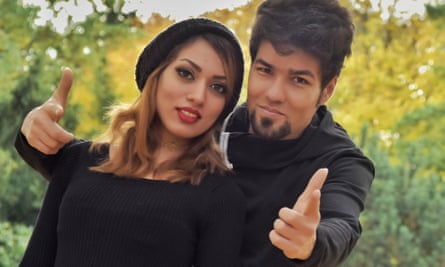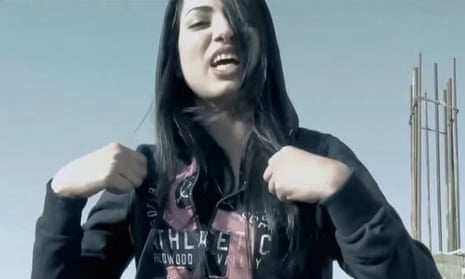Life has not been easy for Paradise Sorouri. In the past seven years, the 27-year-old has been forced to flee her country twice, received more death threats than she can count, and was brutally beaten by 10 men on the street and left to die. Her crime? She covers her head with a baseball cap instead of a hijab, raises her voice for women’s rights, and is Afghanistan’s first female rapper.
In a country where, according to the UN, 87% of women have endured physical or sexual violence, Paradise’s scathing lyrics about gender inequality in post-Taliban Afghanistan have served as a spark for change and a lightning rod for controversy. She raps defiantly in Dari about how women can get acid poured on their faces for resisting rape, be married off as children to older men, and belong to husbands who can set them on fire.
“It doesn’t matter if you are a singer, an artist, or a teacher,” says Paradise. “If you are a woman in Afghanistan, you are a problem. I am speaking out and fighting for women who don’t have a voice.”
Speaking out has come at a price, but it has also garnered support. Paradise was recognised by the UN in 2013 for promoting human rights, while she and her fiance Diverse – together they are known as 143Band – won the Afghan ATN network’s award for best rap act in 2015. The duo are nominated again this year.
But as her popularity soared, so did the number of violent threats she received. Fearing for their safety, last year she and Diverse fled Afghanistan and joined the more than one million migrants who arrived in Germany from the Middle East.
In the process, the pair have begun to reach an entirely new audience, writing and producing songs in their Berlin flat and touring throughout Germany. They release their first music video in two years next month for the song Bosaye Eshgh, they’ve just headlined at the international FeminEast festival in Stockholm, and Rebel Beats, a documentary about Paradise’s struggle as Afghanistan’s first female rapper, will appear in European film festivals early next year.
Born in Iran to Afghan parents who escaped the country’s civil war, Paradise moved back to Herat, Afghanistan’s third largest city, with her family following the fall of the Taliban. She grew up idolising Tupac, Eminem and Beyoncé though didn’t know anyone who shared her love of hip-hop until she met Diverse – another former refugee just back from Iran. The two decided to start making music together in 2008, but the odds were against them.
“Herat is a very religious city,” says Diverse. “Sharia law forbids women to sing. The fact that we are not married was also a problem. Every time we’d try to go to a studio together, strangers would start following us.”
One night, Paradise was walking home with her younger brother when 10 men on six motorcycles surrounded her and started beating her with wooden rods. “They were shouting at me and saying I was a bad influence on other women by trying to make music,” Paradise says. “All I could do was to try to defend my brother. They passed me from one man to the next. I begged people nearby to help, but they just urged the men to beat me to death.”

When Diverse found her, Paradise’s clothes were torn and she was covered in blood. He immediately took her to the police. “They told me I should stop singing,” says Paradise. “That’s when I knew that if I stayed silent, nothing would change.”
Fearful of what might happen if they stayed in Herat, the couple moved to neighbouring Tajikistan in late 2010, where Paradise began writing songs about women’s rights over Diverse’s beats. The following year, they released Faryad-e Zan (Woman’s Shout), the first song ever to feature a female Afghan rapper. In the years since, Paradise says she feels “proud and honoured” to have ushered in a handful of other female rappers, even if several have claimed to be the country’s first while simultaneously asking her for guidance.
During the next two years, the duo recorded nine more songs and shot five videos in the relative safety of Tajikistan. Then, in the summer of 2012, Paradise received horrific news: back in Herat, to avoid being married off to men in their 60s, her two young cousins – aged nine and 12 – had burned themselves alive.
Devastated, Paradise returned to Afghanistan and recorded a song in their memory called Nalestan. “I wanted to think and they hit me in the head,” she sang. “They burned my face in the name of Islam / And sold me because I’m only a woman.” The song won international attention, with 143Band named Afghanistan’s best rap artist at the 2014 Rumi world music awards.
“The success of Nalestan was both good and bad,” Paradise says. “We were interviewed by journalists from all over the world, but I started to get death threats every day. It got so bad I had to stay inside my sister’s house in Herat for a month like a prisoner.” Still, Paradise and Diverse were convinced their message of female empowerment would be more effective if they stayed in Afghanistan, so they relocated once more, this time to Kabul.
When Rebel Beats began filming in early 2015, a woman named Farkhunda – who was falsely accused of burning the Qur’an – had just been beaten to death and set alight by an angry mob in the street. The daily barrage of threats directed at Paradise had also reached a fever pitch and, throughout the film, she anxiously looks over her shoulder to see if she’s being watched.
At one point, the camera holds on a stony-faced Paradise as she reads message after message directed at her on 143Band’s Facebook page. Several men describe wanting to rape and behead her in front of Diverse. Another says he’ll throw acid on her if he ever sees her in person. The only time she breaks is when she’s asked about Farkhunda. “She has made me stronger,” Paradise says, fighting back the tears. “I will fight – not only for Farkhunda, but for all the Farkhundas.”
A month after the cameras stopped rolling, Paradise and Diverse left Afghanistan for good and began the arduous process of resettling in Berlin. Paradise is still fighting and is scheduled to speak at Talking Taboo, an international conference for women’s rights in London on 2 December.
“The people of Afghanistan still need our voice,” she says. “From here, we can make it louder.”

Comments (…)
Sign in or create your Guardian account to join the discussion